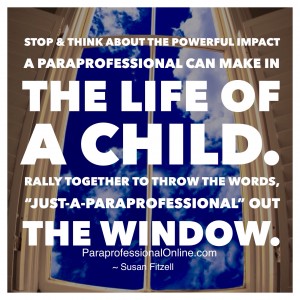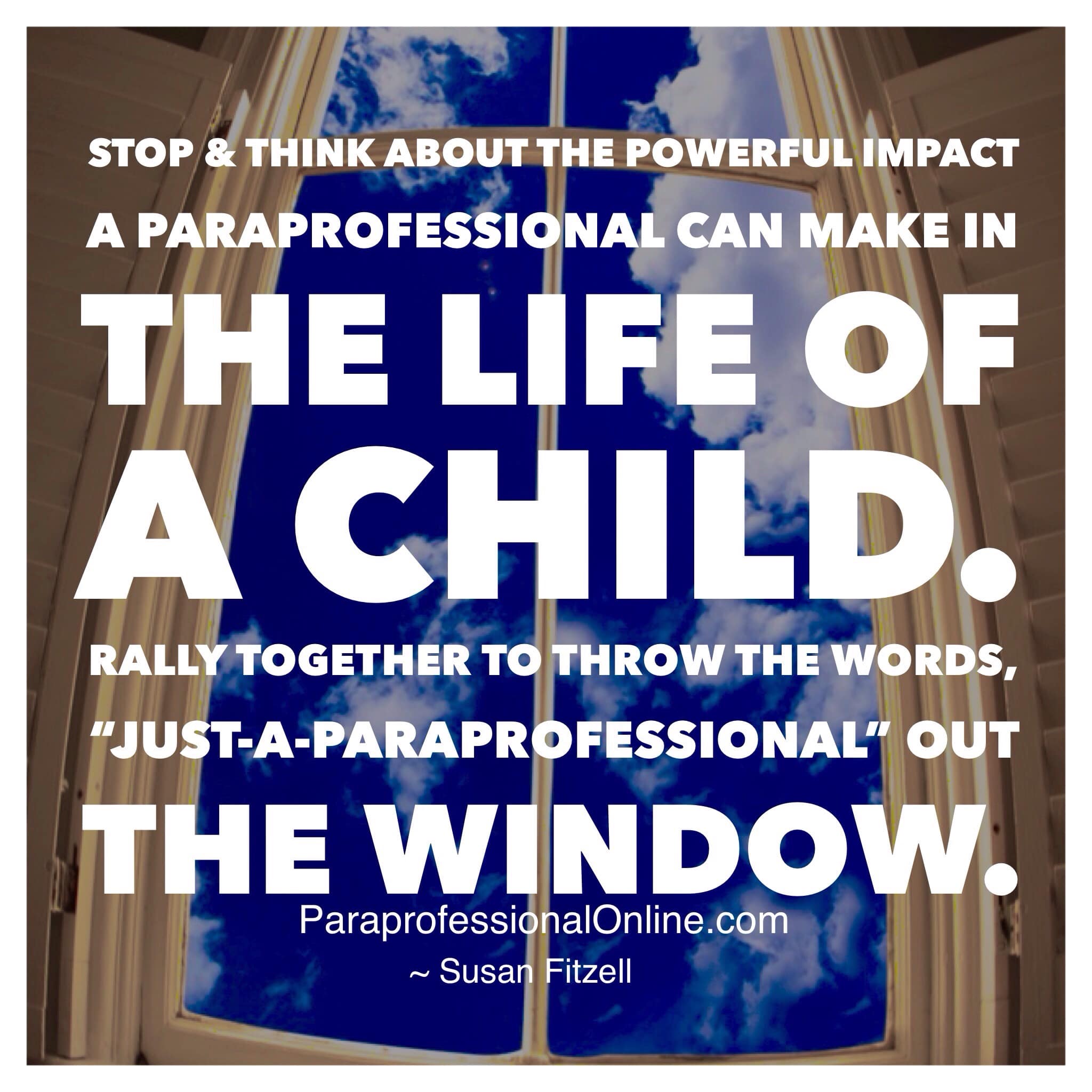It was during my Paraprofessionals and Teachers Working Together seminar, a paraprofessional walked up to me and said, “I know that you said we shouldn’t ever say, “I’m ‘just’ a paraprofessional,” but, what do I do when my principal says that to me? My principal tells the teacher’s assistants at our school we can be replaced. He says we are a dime a dozen.”
 As I listened to this woman and saw the pain deep in her eyes, I was horrified at the insensitivity and lack of humanity in the words this paraprofessional has heard. How could one human being in our educational community be so incredibly disrespectful to another? Okay, you might be thinking, “Susan, what world do you live in? This often happens in schools.” I do know this at some level; I suppose I just don’t want to believe it. What could possibly be gained from diminishing the worth of the adults charged with educating and supporting our children?
As I listened to this woman and saw the pain deep in her eyes, I was horrified at the insensitivity and lack of humanity in the words this paraprofessional has heard. How could one human being in our educational community be so incredibly disrespectful to another? Okay, you might be thinking, “Susan, what world do you live in? This often happens in schools.” I do know this at some level; I suppose I just don’t want to believe it. What could possibly be gained from diminishing the worth of the adults charged with educating and supporting our children?
Is there anything to be gained by creating a culture in our schools where paraprofessionals (teaching assistants, aides, paras, para-pros, classroom assistants) are viewed as ‘less than’?
Paraprofessionals have a vital role in our schools. Often, as one parent expressed, paraprofessionals are the least paid, least trained people in the school community, yet they are often charged with caring for and academically supporting the most challenging and most needy students. Paraprofessionals often work for a salary that is barely above minimum wage. Many are provided with little or no training. They are often excluded from staff development opportunities or are only invited to participate without compensation.
Imagine the chaos in our cafeterias, the pandemonium on the playground, the commotion in the classroom if not for the supervision of paraprofessionals. Paraprofessionals are critical to providing the best supportive educational environment for students.
Paraprofessionals, like teachers, come into the educational system with diverse backgrounds and abilities. Teachers and administrators need to tap into a paraprofessional’s strengths. When we work together to maximize a paraprofessional’s talents and empower them to use those talents in our schools, we all benefit, especially the children. Read on for some powerful testimonials that give credence to the value of our paraprofessionals.
Carol Ekster, a recently retired teacher in New Hampshire expressed her appreciation for her paraprofessional, Karen. She wrote, “Susan, I taught in Derry, New Hampshire for 35 years. Last year was my last year teaching and I had a one-on-one aide in my room for a William’s Syndrome child. She was dedicated to that child’s welfare, rarely absent, thoughtful and loving to other children who benefited from her attention, and always willing to help me if needed. She thought about that child and the class at home, bringing in relevant or needed things at her own expense. She was one of those humble and incredibly giving people who made a difference in our classroom last year.”
Is there a human being dedicated to the welfare of our children that could sleep at night if they considered Karen, “just” a paraprofessional? I hope not.
Julia Hornberger, a special education teacher at Muhlenberg High School in Pennsylvania adds, “For the last five years, I have had the great pleasure of working with Kathy Etchberger. During a transition period between paraprofessionals for my caseload, Kathy was hired as a substitute. I admired her immediately, as she was confident, competent, and caring. It was the first time in my career that someone besides my wonderful mentor was actually helping me, and the students absolutely loved her. Unfortunately, Kathy was not hired as my full-time paraprofessional. I was devastated. She was everything that I needed in a paraprofessional and, even more, as a friend.”
Julia continues, “Luckily for both of us, she was later hired as the paraprofessional for my mentor teacher. Even though she isn’t “assigned” to my caseload anymore, she is literally right next door. Kathy knows what I need, often times before I even know that I need it, and she is always there to help and guide me. I like to consider her the “rock star” of my close group of teaching friends. Any time I am in the hallway with her, students are always calling her out and coming to share the good news with her – something which never ceases to amaze me. She has such a positive impact on everyone who surrounds her. Kathy has truly touched my life, and I am so grateful for all that she has given me”
Michael Tinker, from W. G. Vinal Elementary School in Massachusetts shares this story about a crowded cafeteria, a baloney sandwich, and very astute, quick thinking paraprofessional. “A boy was choking on a baloney sandwich in the cafeteria. The chaos and decibel level was tipping into the red on the meter, yet one of our paraprofessionals, Sue Scott, picked him out – even though this child was in the middle of everyone and everything. Because of her quick thinking, the child was okay. Then, last year, we lost one of our colleagues, a kindergarten teacher. Sue was close to the teacher who passed away yet, rather than grieve, she went in “for the kids” until the school was able to find another teacher. She helped give the kindergarteners the stability they needed by being the long-term substitute. In both situations, Sue made a huge difference. She was there first and foremost for the kids. She quite literally saved the day.”
Teachers are not the only ones who appreciate their paraprofessionals. Often, parents are deeply impacted by the quality of care their children receive from paraprofessionals.
Heidi Crum of Denver, Colorado shares a parent’s perspective. Her son, Cal, has cerebral palsy and needs a one-on-one assistant. Her son has that and more in Erin. Erin has been working with Cal for the past two years. Heidi explains that she’s an outstanding para. She works to create a lot of independence for him. He makes progress and may flatten out for a while, then grows again. This concerned mom understands the struggles paraprofessionals face. She notes that paras have to know when to push and when not to, in order to promote self-sufficiency in their students. This is not always black and white and is a continual dilemma for the paraprofessional. Heidi appreciates that Erin is willing to discuss Cal’s progress calmly and professionally. She works as a team with the teachers and makes sure that other paras work with Cal so he’s not dependent on her. She truly takes ownership of her work.
Heidi believes strongly that it is very important for teachers and paraprofessionals to be a team. From a parent’s point of view, the paraprofessional becomes the frontline person. She explains, “She’s the one primarily interacting with, and developing, my child as a learner. There is so much interaction between the child and para. It impacts how the child views himself and his abilities.” It’s very important for the teachers and paras to work together for the benefit of the child.
I remember Jay Gratton from teaching high school. Jay would walk into my class and his smile would light up the room. Jay learned differently. I recently heard Jay speak at the retirement party of an amazing human being, a paraprofessional, Kathy Wicker, who meant so incredibly much to many, but also to Jay and I. Jay shared these words from the podium, “I am a special education teacher at Merrimack High School. Not only am I an alumnus of Londonderry High School and their Special Ed. Department, but I was also lucky enough to work at LHS for 3 years as a para. I have never been around someone who gives more of them self than Mrs. Wicker. Her tremendous dedication to her family, colleagues, friends, and students is inspiring. For me, Mrs. Wicker took a student who doubted his every ability and who wanted nothing to do with school and turned him into a 4-year honor student in one quarter. Mrs. Wicker was an angel that never left my side in high school and never let me fall. When I would stumble she would always be there to help me up. It is very simple; I loved this woman and still do very, very much.” Jay spoke these words directly to Kathy, “The main reason I went into education is because of you, Mrs. Wicker. I can’t even imagine where I would be right now without you being involved in my life. If I can make just half the impact on one student that you made on me, then I will have been a success. If I can make just one student feel as special and as important as you made me feel, then I will have been a success. At school I am constantly asking myself what you would do in a given situation and that is the reason your compassion, heart, enthusiasm, and love for helping others will always have a place in New Hampshire schools.”
What Jay doesn’t know is that Kathy was also a formative role model for me. Kathy taught me the importance of appreciating my colleagues. She always knew when someone needed a pat on the back, a hug, or a Snickers bar. I learned to be a better colleague from her.
Jodi Roberts, a paraprofessional in Surprise, Arizona tells us, “Several years ago, there was an instructional coach, April, in the district who would observe classes and coach teachers. She would then leave the teachers little sticky notes with suggestions. One day while I was talking to April I must have said five times, “Well, I’m just a T.A. (Teacher’s Assistant). I used to say that all the time. I felt unworthy. I have a college degree and have spent years working in schools, but I still lacked confidence. One day, after a conversation with April, I found a sticky note from her that said, “You are not “just” a T.A.” I saved that forever and always remembered that.” Jodi explains, “Words are powerful.”
I sincerely believe that most paraprofessionals are valued by the teachers with whom they work. I believe that most administrators understand and appreciate the contribution that paraprofessionals make in their schools. I believe that if we simply stop and think about the powerful impact a paraprofessional can make in the life of a child, we can rally together to “Throw the phrase, “just a paraprofessional” out the window.”
Are you with me? Pass this one to your education colleagues and join the campaign to appreciate the contribution of paraprofessionals in your school.

Bring Susan to your campus!
Featured seminar – Paraprofessionals And Teachers Working Together in the General Classroom

